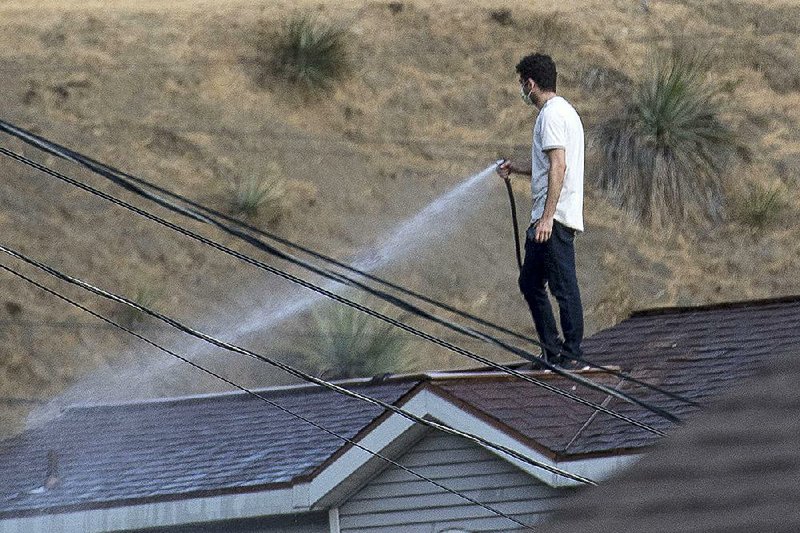LOS ANGELES -- A sudden gusty series of rainstorms allowed Los Angeles to cancel evacuation orders for a wildfire that the mayor called the largest in the city's history and sent beach umbrellas and toy shovels bouncing down Southern California beaches Sunday evening.
The rainstorms were another part of a sweltering, smoke-shrouded holiday weekend of record heat and of wildfires that had forced thousands to flee homes across the U.S. West.
In Oregon, crews were rescuing about 140 hikers forced to spend the night in the woods after fire broke out along the popular Columbia River Gorge trail. Search and rescue crews air-dropped supplies on Saturday as flames prevented the hikers' escape. Wildfires also burned in a 2,700-year-old grove of giant sequoia trees near Yosemite National Park, forced evacuations in Glacier National Park and drove people from homes in parts of the West struggling with blazing temperatures.
Los Angeles Mayor Eric Garcetti had declared a local emergency earlier Sunday and Gov. Jerry Brown did the same on the state level for Los Angeles County after the wildfire destroyed three homes and threatened hillside neighborhoods. More than a thousand firefighters battled flames that chewed through more than 9 square miles of brush-covered mountains.
By evening, however, the day's record heat in Los Angeles had eased and a spate of brief storms even brought a bit of rain to the burning slopes, slowing the progress of the wildfire. Authorities were able to cancel the evacuation orders that had been issued for three cities -- Los Angeles, Burbank and Glendale -- and allow all of the 1,400 people who had fled to return to their homes.
Conditions slowing the blaze could change again "in a moment's notice, and the winds can accelerate very quickly," Los Angeles Fire Capt. Ralph Terrazas warned, however. "There is a lot of fuel out there left to burn."
Officials were keeping an eye on thunderstorms, which were bringing welcome bursts of rain but also the risk of flash floods, mudslides and lightning. Beachgoers in Santa Barbara filmed one sudden storm there that sent palm trees flapping and toddlers chasing beach toys that the wind was blowing down the beach.
The high at Los Angeles International Airport reached 97 degrees Fahrenheit on Sunday, topping the previous mark of 92 set in 1982. Records were also set in parts of Ventura and Santa Barbara counties, where the temperature hit 101 degrees.
Burbank resident George Grair was not in the evacuation zone but watched uneasily as flames blackened a hillside in the near distance.
"It's very difficult to feel safe. I've got kids in the house," he told KABC-TV. "I probably slept two hours all night."
San Francisco residents, meanwhile, stifled under a third day of a rare heat wave in the coastal city, although highs in the San Francisco Bay Area fell Sunday from all-time records set the previous two days.
"I went to Home Depot, Walgreens, Office Depot, Target. They were sold out," downtown office worker Alganesh Ucbayonas said Sunday, detailing her unsuccessful search for a fan. "CVS," she remembered.
On Sunday, Ucbayonas sat at her desk in a building lobby squarely between two fans, both scrounged from her office building's storage and trained straight at her face.
"I have never seen any heat like this in 10 years in the Bay Area," she said.
Fires burning up and down California's Sierra Nevada and farther to the northwest cast an eerie yellow and gray haze over much of California, and much of the state was under alerts because of poor air quality.
California authorities ordered evacuation for a third small town Sunday in one of the wildfires, a blaze that has burned 9 square miles near Yosemite National Park.
Firefighters battling that blaze were making it a priority to safeguard a 2,700-year-old grove of giant sequoia and a pair of historic cabins at the grove, fire spokesman Anne Grandy said. Fire crews had wrapped the two 19th-century cabins and an outhouse in fire-resistant material to protect them from the flames that had entered the Nelder Grove, Grandy said.
The flames were consuming old brush and dead wood on the forest floor, but had not burned the giant sequoia, some of which top 20 stories in height, she said. The millennia-old trees already had "survived thousands of fires," she said.
California crews are also protecting homes from a fast-moving wildfire that forced evacuations in Riverside County.
In the Pacific Northwest, high temperatures and a lack of rain this summer have dried out vegetation that fed on winter snow and springtime rain. Officials warned of wildfire danger as hot, dry, smoky days were forecast across Oregon and Washington over the holiday weekend. In Washington state, Gov. Jay Inslee proclaimed a state of emergency across all counties as three major fires closed recreation areas and prompted evacuations.
Flames in Montana's Glacier National Park prompted officials to evacuate all residents, campers and tourists from one of the most popular areas of the park. The order Sunday affects the Lake McDonald area, the western side of the Going-to-the Sun Road and some of the most visited trails in the area. The Lake McDonald Lodge, built in 1913, closed last week because of heavy smoke in the area.
Forecasters said more heat could be expected when remnants of Tropical Storm Lidia move north from Mexico's Baja California during the weekend.
Information for this article was contributed by Christopher Weber, Ellen Knickmeyer, Justin Pritchard, Matt Volz and Martha Bellisle of The Associated Press and by Adam Nagourney of The New York Times.
A Section on 09/04/2017
